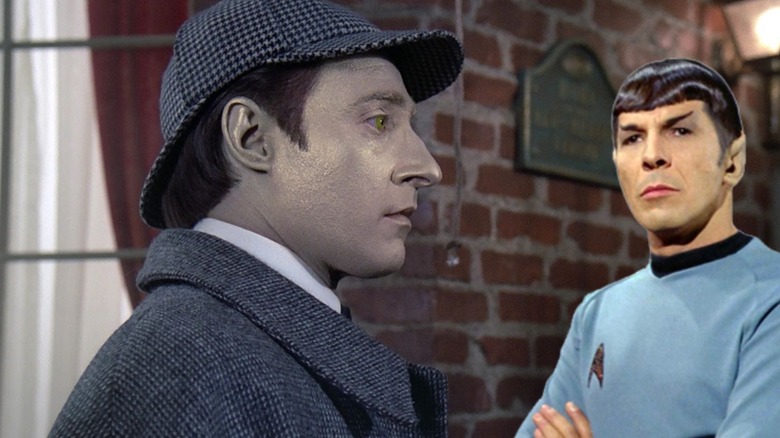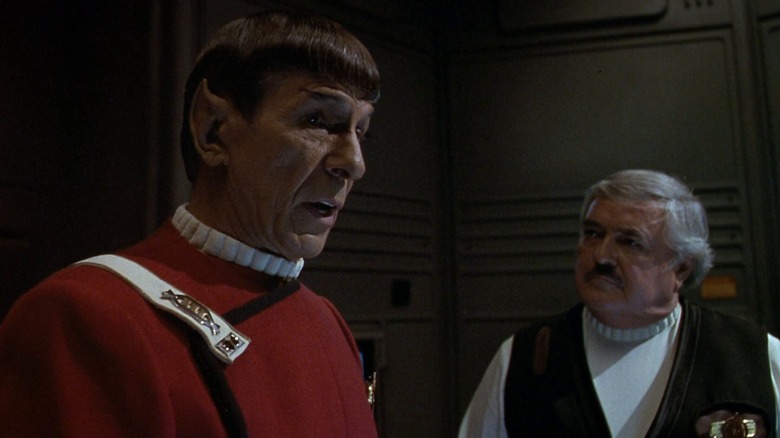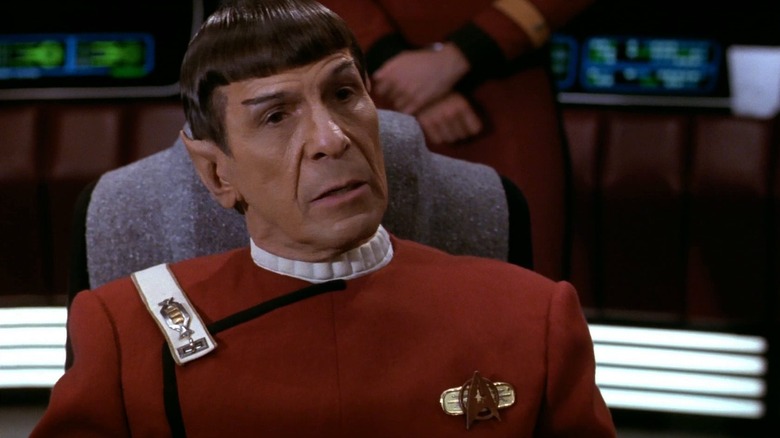A Star Trek Fan Theory Links Spock To Sherlock Holmes
In Nicholas Meyer's 1991 film "Star Trek VI: The Undiscovered Country," Spock (Leonard Nimoy) and the crew of the Enterprise are investigating an elaborate mystery. The Enterprise was seemingly framed for firing upon a Klingon vessel during a vital diplomatic mission, and two officers from the Starfleet ship beamed over afterward and assassinated a Klingon chancellor. No one knows the identity of the assassins, nor how the Enterprise could have fired on the Klingon ship when they still have a full complement of torpedoes.
Regardless, Captain Kirk (William Shatner) and Dr. McCoy (DeForest Kelley) are arrested and sent to a remote Klingon prison planet, requiring Spock to find the evidence to exonerate them (as they are clearly innocent). During his investigation, Spock logically dictates to the Enterprise's crew that, "An ancestor of mine maintained that if you eliminate the impossible, whatever remains — however improbable -– must be the truth." This quote, as murder mystery fans will immediately tell you, is most often credited to Sherlock Holmes, the star detective of the many short stories penned by Sir Arthur Conan Doyle between 1887 and 1927. Holmes, like Spock, was logical and focused, using his keen talents for analysis, observation, and deduction to solve complex conundra.
Of course, a question immediately arises when hearing that quote: Why did Spock refer to Sherlock Holmes as "an ancestor of mine?" Spock is half-human, of course, with a mother who came from Earth. It's wholly possible that he would have famous humans somewhere in his lineage. The central problem: Sherlock Holmes is fictional. This has some fans positing that "Star Trek" takes place in a universe where Sherlock Holmes was real, and that Spock's mother is one of Holmes' descendants.
This theory, while tantalizing, can't possibly be correct.
Reasons why the Spock/Sherlock theory couldn't be true
Director Nicholas Meyer was very fond of murder mysteries, and had previously written a Sherlock Holmes movie called "The Seven-Per-Cent Solution" in 1976. He's also a member of the Baker Street Irregulars, the world's first Sherlock Holmes literary society. In a 2004 interview with the Groucho Reviews website, Meyer was asked directly if Spock was a descendant of Sherlock Holmes. He only slyly replied with "He implies it." Meyer, it seems, liked the idea that Spock was related to Sherlock Holmes, so he slipped his little Doyle reference into "Star Trek VI."
There are several reasons, however, why Spock is not descended from Sherlock Holmes. Most notably, Sherlock Holmes is repeatedly referred to as a fictional creation throughout "Star Trek." There are two episodes of "Star Trek: The Next Generation" — one of which aired before the release of "Star Trek VI" — wherein characters play-act as Holmes and Dr. Watson. Indeed, a holographic recreation of Holmes' nemesis, Professor Moriarty (Daniel Davis), mysteriously gains consciousness and threatens to take over the Enterprise. Although it's fun to ponder, "Star Trek" and Doyle's Sherlock stories do not take place in the same universe.
Another wrench thrown into the gears of the Spock/Sherlock theory (SherSpock?) is that Sherlock Holmes didn't make the "whatever remains is the truth" saying. The quote originates in the Arthur Conan Doyle story "The Fate of the Evangeline," a romance first published in 1885. "The Fate of the Evangeline," we should note, isn't a Sherlock Holmes story. Indeed, the Doyle character who speaks the "truth" line — a character called only "Scotsman" — credits the saying to Edgar Allan Poe's famed detective character C. Auguste Dupin, the detective from "Murders in the Rue Morgue" (1841). By that logic, it would be August Dupin that Spock cited as his ancestor.
Did Spock imply that he was related to Arthur Conan Doyle?
However, we should hasten to point out that the quote doesn't actually appear in any August Dupin stories, either. Hence, it can't be credited to Poe, and it's not possible that Spock was calling Dupin an ancestor. The line seems to be a Doyle original — it's just not one of Sherlock's bon mots. Sherlock Holmes, however, would go on to use variants of the quote in future Doyle tales. In the 1890 story "The Sign of the Four," Sherlock Holmes is indeed quote as saying the phrase, in slightly different ways, twice.
Of course, perhaps Spock was implying that he was descended not from Sherlock Holmes (as Nicholas Meyer would have us believe), but of Arthur Conan Doyle. It's fun to think that the famed author's great-great-great-etc. grandchild is Amanda Grayson, Spock's human mother. It's worth remembering, though, that the real Doyle had no directly descended grandchildren. Doyle, who died in 1930, had five children with his wife, but none of them had kids of their own. The descendants of Doyle — and the current handlers of his estate — are descended from Doyle's other relatives. Catharine Doyle and Richard Doyle are the kids of Doyle's nephew, Reinhold, making them Doyle's great-grandniece and great-grandnephew. The estate is run by them and a step-grandson named Richard Pooley.
I suppose it's possible that one of these people could, by the 22nd century, become a parent of a parent of Amanda Grayson. Spock, by "Star Trek" lore, won't be born until 2230, so there's still some time for the real world to catch up with "Star Trek."
But with apologies to all the literature nerds of the world, there is no chance that Sherlock Holmes is real in the "Star Trek" universe. We'll have to comfort ourselves with other Spock connections.


